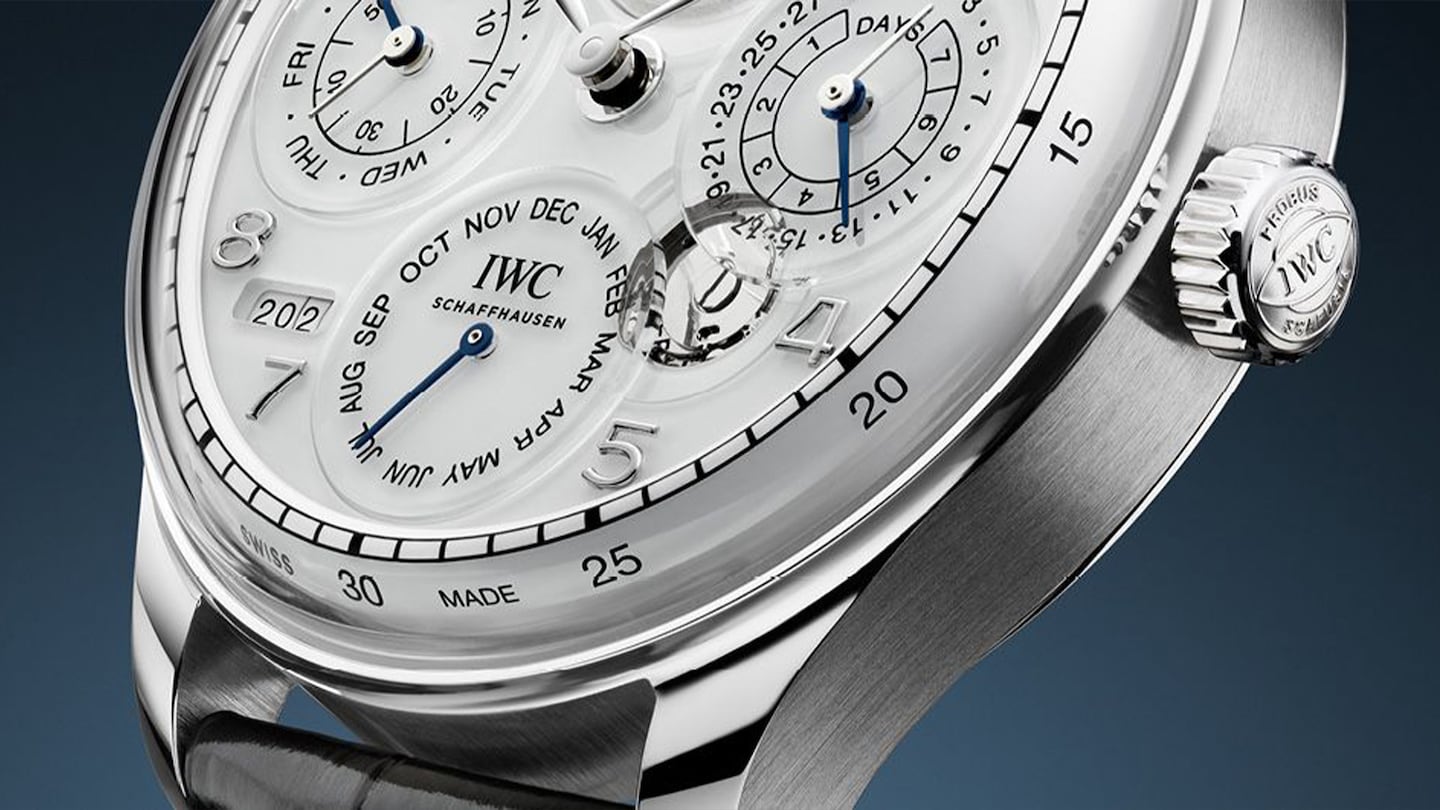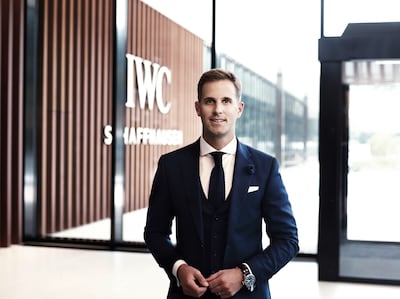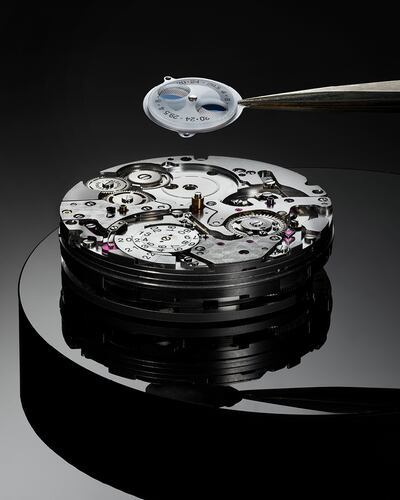
Agenda-setting intelligence, analysis and advice for the global fashion community.

Agenda-setting intelligence, analysis and advice for the global fashion community.

GENEVA – What impact is sustainability having on luxury watch sales? According to industry studies, consumers are more concerned about the environmental impact of a watch than ever before. Deloitte’s Swiss Watch Industry Study, published in October, recorded that 43 per cent of industry executives surveyed said investing in sustainability was one of their “strongest priorities” for this year.
And yet, it felt like sustainability was less of a focus at this year’s Watches and Wonders Geneva, which ends Monday, compared to previous editions.
Even the brand that has championed sustainability in watchmaking over the past two decades appears to be going quiet on it: IWC, which had led the charge on the topic since being certified as carbon neutral in 2007, did not publish its annual sustainability report this year.
In a November report rating Swiss watch brands’ sustainability performance, the WWF underscored that the industry was still lagging on key topics like transparency, traceability and accountability for the social and environmental impact of mining. Still, it ranked IWC as the company with the most “ambitious” sustainability profile due to its more detailed annual reporting and advances in manufacturing. Not producing a report will be seen by the WWF as a backward step.
ADVERTISEMENT
Asked why IWC, which is part of the Richemont Group, had backtracked on its commitment to transparent reporting, the company’s chief executive Chris Grainger-Herr said the company would now provide information on its environmental impact to the group. “We’re part of an ESG [environment, social and governance] framework within the group and we’ve started to report that at group level,” he said.
Less transparency — its impact will now be mixed with data on all the brands in the group — won’t mean less progress, Grainger-Herr said. “Our ambition is to continuously improve on all of the major [sustainability] factors.” Still, in the absence of reporting, such claims become more difficult to verify.
Grainger-Herr also said a partnership with the supermodel Gisele Bündchen, who acts as an advisor to IWC’s sustainability committee and has starred in nature-themed campaigns for the brand, would continue. “Yes, we work with her as closely as possible,” he said. He also confirmed sustainability would remain a key marketing pillar for the brand. The sustainability section of the company’s website did not appear to have been updated since 2022, however.

Research suggests sustainability matters to luxury watch buyers. In its study, Deloitte reported that 48 percent of watch buyers said sustainability was one of the most important factors behind a luxury watch purchase, and that similarly, 41 percent of pre-owned watch buyers were motivated by sustainability, second only to considerations of price.
Still, the report also found that sustainability ranks as the fourth most powerful driver behind a watch purchase — following brand image, design and price. And there’s often a gap between what customers say and what they actually buy.
One industry expert suggested IWC would be smart to move away from sustainability messaging, and to leave reporting to the group. “Choosing sustainability gives IWC an angle of communication, but not values or vision,” said Oliver Müller, founder of the Swiss consultancy LuxeConsult. “At the moment, the brand lacks purpose, even though the product and marketing mix is well executed.”
IWC’s sustainability efforts have earned clout within the industry on a key topic, as well as accolades from groups like WWF — but this doesn’t appear to have reinvigorated sales.
Richemont keeps a close guard on the financial results of its brands, and Grainger-Herr declined to comment on IWC’s performance. But according to a Morgan Stanley report estimating the size of Swiss watch brands (of which Müller is a co-author) IWC’s revenues dipped from 908 million Swiss francs ($996 million) in 2022 to 726 million Swiss francs last year.
ADVERTISEMENT
“The brand suffers from a high price positioning compared with direct competitors, mainly Breitling and Omega,” said Müller. “The proportion of clients buying a watch at this price point, only or mainly because of a brand’s sustainability performance is, unfortunately, very low.”
Schaffhausen-based IWC has been the flag-bearer for more sustainable practices in Swiss watchmaking since its carbon-neutral certification almost two decades ago. In 2018, it opened a state-of-the-art $43 million factory that draws energy from solar panels and water for cooling and heating from groundwater sources. It has also partnered with entrepreneurial start-ups such as Boom Supersonic, an aviation company looking to decarbonise supersonic air travel. On reviewing its activities, the WWF had concluded IWC is Switzerland’s most sustainable luxury watch company.
Swiss watch brands including Breitling and Oris have also emphasised sustainability commitments in recent years. The start-up watch company ID Genève has generated buzz for building its product and marketing strategy around circularity, the principle of re-using existing materials and eliminating waste throughout products’ life cycles. However, it’s unclear whether their efforts will really translate to customer demand at scale. Reports of IWC’s falling revenues last year came amidst a fast-growing market in which the broader Swiss watch industry reported record export values (up 7.6 percent to 26.7 billion Swiss francs).
“We have [demand for sustainability] on an anecdotal level, but it’s not something that I can measure empirically,” Grainger-Herr said. “We see that this is one important driver, understanding that a product is made as responsibly as it can be and that the brand is striving to improve what it does on that front continuously.”
Deloitte’s study indicated the appetite for sustainability in a luxury watch was more pronounced among young buyers. “They make very conscious decisions about products they purchase,” said Christian Knoop, IWC’s creative director. “They’re interested in lasting value and in authentic brands. We have to work on our credibility, and sustainability and improvement in sourcing materials, in production methods and in environmental measures for buildings are all part of that.”

At Watches and Wonders Geneva this week, IWC has introduced a collection of Portugieser models that invoked sustainability through timeless design rather than buzz-words like traceability. One high-end piece featured a new complication the brand is calling an “Eternal Calendar,” which it says could keep track of the date until the year 3999 and the phases of the moon for 45 million years assuming it’s kept wound and maintained. The origins of the design go back to the 1930s.
“It’s important in the design process to create a design that is meant to last and not to just play into the latest fashion,” Knoop said.
The law may yet dictate watch brands’ approach to sustainability. Last year, Switzerland passed the Swiss Climate and Innovation Act, the goal of which is for Switzerland to become climate neutral by 2050.
ADVERTISEMENT
Asked by The Business of Fashion whether the Swiss watch industry would be caught out by the act, Cyrille Vigneron, chief executive of Cartier — another of the industry’s ESG front-runners — said that while manufacturing processes inside the country were “quite ok”, upstream issues in the supply chain or downstream impacts like the environmental cost of global distribution remained common.
And he issued a warning. “Where Swiss watchmaking is not really ready is for transparency,” he said.
Christian Dior Couture hopes to reinvigorate its watch division by relaunching its early 2000s Chiffre Rouge line — this time with fancier complications and a price to match.
Omega’s sales have recovered and surpassed pre-Covid levels, CEO Raynald Aeschlimann said. But aggressive price hikes, step-and-repeat marketing and an authenticity scandal could challenge the Swatch-owned brand’s ascent.
At Geneva Watch Days 2023, CEOs of Bulgari and Breitling fuelled the fire of an ongoing rivalry with Watches and Wonders. The comments come as Swiss watchmaking’s calendar fills up with more events both in Switzerland and abroad.
The FTC argued at an eight-day trial in New York that the merger would eliminate fierce head-to-head competition between the top two US handbag makers.
The Birkin bag maker reported a hefty rise in third-quarter sales on Thursday, continuing to outperform rivals hit hard by a sharp slowdown in luxury demand.
Sales at the French group fell 16 percent in the third quarter as a market-wide downturn hit hard. At flagship brand Gucci, where revenue fell 25 percent, management is exploring store closures while betting on a revamped handbag programme to jump start demand.
The tie-up between the French couture giant and the Hindi film star comes as luxury executives eye India’s high growth potential.